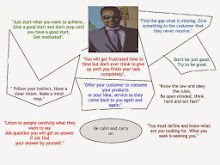When David Cameron went for his first interview at Conservative Central Office, the Mail on Sunday once wrote, the party received a phone call from a man in Buckingham Palace. "I understand you are to see David Cameron," the caller said. "I've tried everything I can to dissuade him from wasting his time on politics but I have failed. I am ringing to tell you that you are about to meet a truly remarkable young man."
Whether the story is true or not, the statement certainly is. Having only entered the Commons in 2001, he became party leader in 2005 and aims to be prime minister in 2010. The story before his parliamentary rise is just as interesting, however.
Labour figures are prone to questioning Cameron's reputation as a modernising progressive because of his long history with the party when it was nothing of the sort. He was seconded to Downing Street in 1991 to help John Major prepare for PMQs, where he impressed sufficiently to be given the task of briefing the prime minister for his press conferences during the 1992 general election.
Having won that election - a feat considered a small miracle in many parts of the country - he was made special advisor to chancellor Norman Lamont. It couldn't have come at a worse time. Black Wednesday saw the pound fall outside of the European Exchange Rate Mechanism, and Lamont's reputation lay in tatters. When he was sacked in May 1993, Cameron will have been pleased to note that the disgrace had not attached itself to him personally, and Michael Howard adopted him over at the Home Office. To this day, Labour figures bring up Cameron's role during Black Wednesday as proof he cannot be trusted on economic matters.
Cameron's relationship with Howard, both at the Home Office during one of its more reactionary phases and during the 2005 election campaign, when Howard was Tory leader, provides much of the ammunition for opponents who suggest Cameron is a typical right-wing Tory wolf in progressive sheep's clothing.
While Howard's stint at the Home Office and his election campaign were surprisingly right wing, the argument is watered down somewhat by Cameron's activities at the home affairs select committee upon entering parliament in 2001. He convinced the committee to look into drug law and urged "radical options" to be considered. He then defended the subsequent report, which called for ecstasy to be downgraded to class-B and a policy of 'harm reduction' implemented.
Once he became party leader, following a surprising and supremely confident contest against a host of better known colleagues, Cameron adopted a staunchly modernising agenda with gusto and panache. Critics laughed at his photo call with huskies and the party new logo, which featured a child's drawing of a tree, but it did the job: the Tories drew level with Labour, and, after a short-lived bounce when Gordon Brown entered Downing Street, surpassed the government in the polls.
That strong showing is now much weaker, leading to concerns that Cameron's PR background may be turning voters off. An airbrushed image of him on an early election poster prompted giggles among political pundits and the party's tough economic message does not appear to be playing well with voters. The miracle boy so loved by someone in Buckingham Palace won't be taking anything for granted until he's walked into No 10.
( Source: Yahoo News Uk)
http://www.politics.co.uk/


